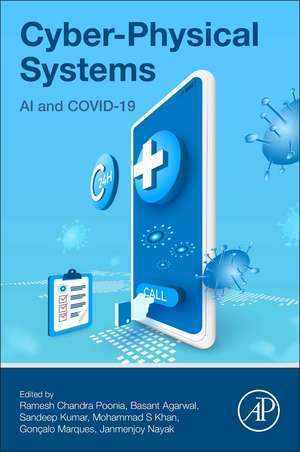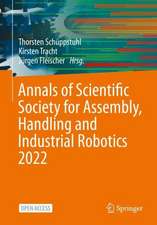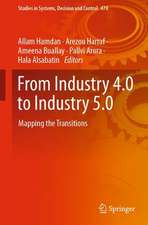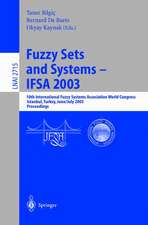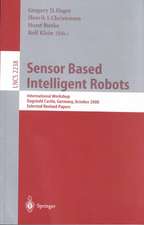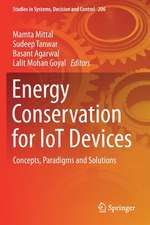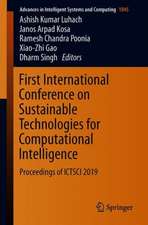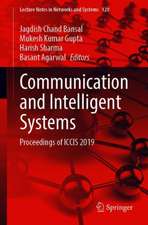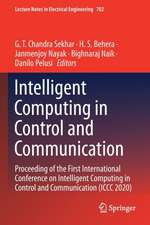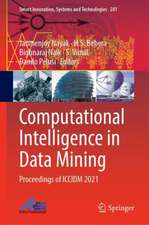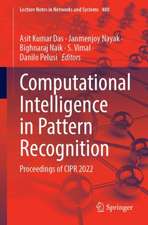Cyber-Physical Systems: AI and COVID-19
Editat de Ramesh Chandra Poonia, Basant Agarwal, Sandeep Kumar, Mohammad S. Khan, Goncalo Marques, Janmenjoy Nayaken Limba Engleză Paperback – 2 noi 2021
The major problem in the identification of COVID-19 is detection and diagnosis due to non-availability of medicine. In this situation, only one method, Reverse Transcription Polymerase Chain Reaction (RT-PCR) has been widely adopted and used for diagnosis. With the evolution of COVID-19, the global research community has implemented many machine learning and deep learning-based approaches with incremental datasets. However, finding more accurate identification and prediction methods are crucial at this juncture.
- Offers perspectives on the design, development and commissioning of intelligent applications
- Provides reviews on the latest intelligent technologies and algorithms related to the state-of-the-art methodologies of monitoring and mitigation of COVID-19
- Puts forth insights on how future illnesses can be supported using intelligent corona virus monitoring techniques
Preț: 639.96 lei
Preț vechi: 838.77 lei
-24% Nou
122.47€ • 127.39$ • 101.11£
Carte tipărită la comandă
Livrare economică 05-19 aprilie
Specificații
ISBN-10: 0128245573
Pagini: 278
Dimensiuni: 152 x 229 x 17 mm
Greutate: 0.38 kg
Editura: ELSEVIER SCIENCE
Cuprins
1. AI-based implementation of decisive technology for prevention and fight with COVID-19 Alok Negi and Krishan Kumar
2. Internet of Things-based smart helmet to detect possible COVID-19 infections Chanchal Ahlawat and Rajalakshmi Krishnamurthi
3. Role of mobile health in the situation of COVID-19 pandemics: pros and cons Priyanka Payal and Rao Sunita
4. Combating COVID-19 using object detection techniques for next-generation autonomous systems Hrishikesh Shenai, Jay Gala, Kaustubh Kekre, Pranjal Chitale and Ruhina Karani
5. Non-contact measurement system for COVID-19 vital signs to aid mass screening—An alternate approach Vijay Jeyakumar, K. Nirmala and Sachin G. Sarate
6. Evolving uncertainty in healthcare service interactions during COVID-19: Artificial Intelligence - a threat or support to value cocreation? Sumit Saxena and Amritesh
7. The COVID-19 outbreak: social media sentiment analysis of public reactions with a multidimensional perspective Basant Agarwal, Vaishnavi Sharma, Priyanka Harjule, Vinita Tiwari and Ashish Sharma
8. A new approach to predict COVID-19 using artificial neural networks Soham Guhathakurata, Sayak Saha, Souvik Kundu, Arpita Chakraborty and Jyoti Sekhar Banerjee
9. Rapid medical guideline systems for COVID-19 using database-centric modeling and validation of cyber-physical systems Mani Padmanabhan
10. Machine learning and security in Cyber Physical Systems Neha V. Sharma, Narendra Singh Yadav and Saurabh Sharma
11. Impact analysis of COVID-19 news headlines on global economy Ananya Malik, Yash Tejas Javeri, Manav Shah and Ramchandra Mangrulkar
12. Impact of COVID-19: a particular focus on Indian education system Pushpa Gothwal, Bosky Dharmendra Sharma, Nandita Chaube and Nadeem Luqman
13. Designing of Latent Dirichlet Allocation based prediction model to detect Midlife Crisis of losing jobs due to prolonged lockdown for COVID-19 B. Das, B. Das, A. Chatterjee and A. Das
14. Autonomous robotic system for ultraviolet disinfection Riki Patel, Harshal Sanghvi and Abhijit S. Pandya
15. Emerging health start-ups for economic feasibility: opportunities during COVID-19 Shweta Nanda
Descriere
Cyber-Physical Systems: AI and COVID-19 highlights original research which addresses current data challenges in terms of the development of mathematical models, cyber-physical systems-based tools and techniques, and the design and development of algorithmic solutions, etc. It reviews the technical concepts of gathering, processing and analyzing data from cyber-physical systems (CPS) and reviews tools and techniques that can be used. This book will act as a resource to guide COVID researchers as they move forward with clinical and epidemiological studies on this outbreak, including the technical concepts of gathering, processing and analyzing data from cyber-physical systems (CPS).
The major problem in the identification of COVID-19 is detection and diagnosis due to non-availability of medicine. In this situation, only one method, Reverse Transcription Polymerase Chain Reaction (RT-PCR) has been widely adopted and used for diagnosis. With the evolution of COVID-19, the global research community has implemented many machine learning and deep learning-based approaches with incremental datasets. However, finding more accurate identification and prediction methods are crucial at this juncture.
- Offers perspectives on the design, development and commissioning of intelligent applications
- Provides reviews on the latest intelligent technologies and algorithms related to the state-of-the-art methodologies of monitoring and mitigation of COVID-19
- Puts forth insights on how future illnesses can be supported using intelligent corona virus monitoring techniques
